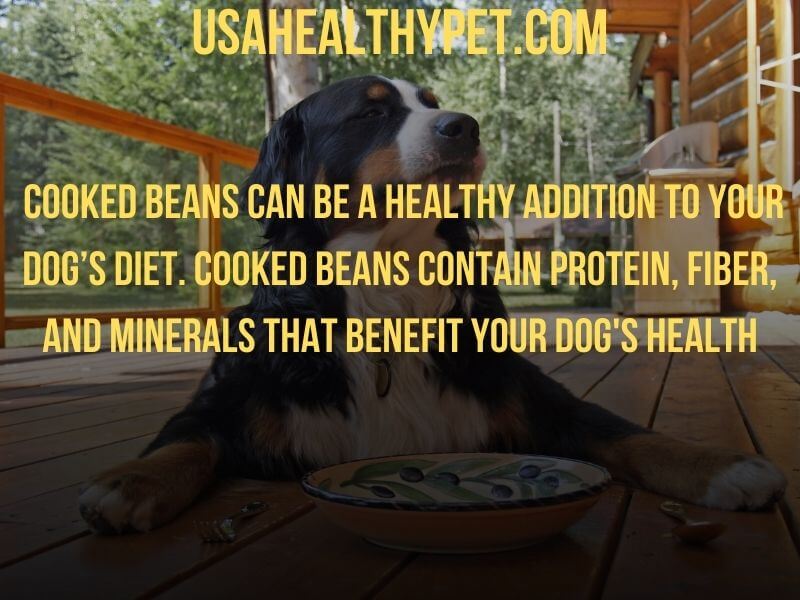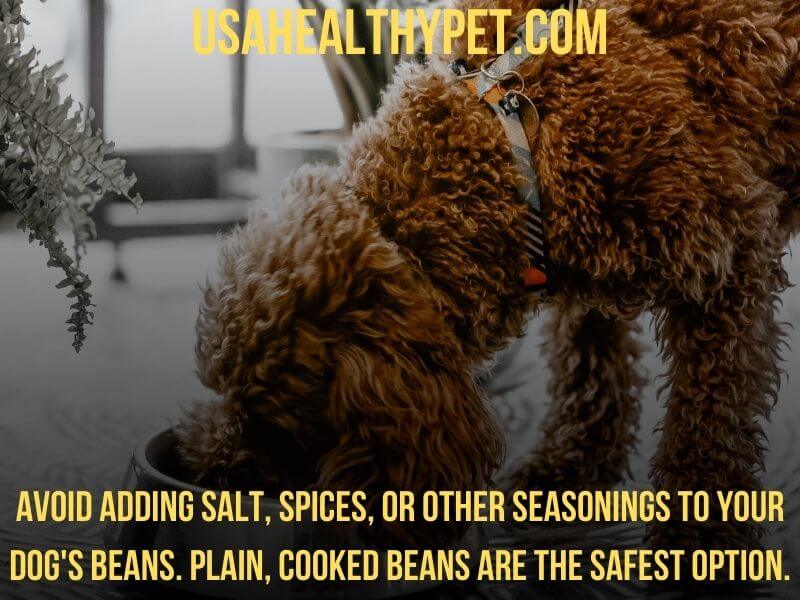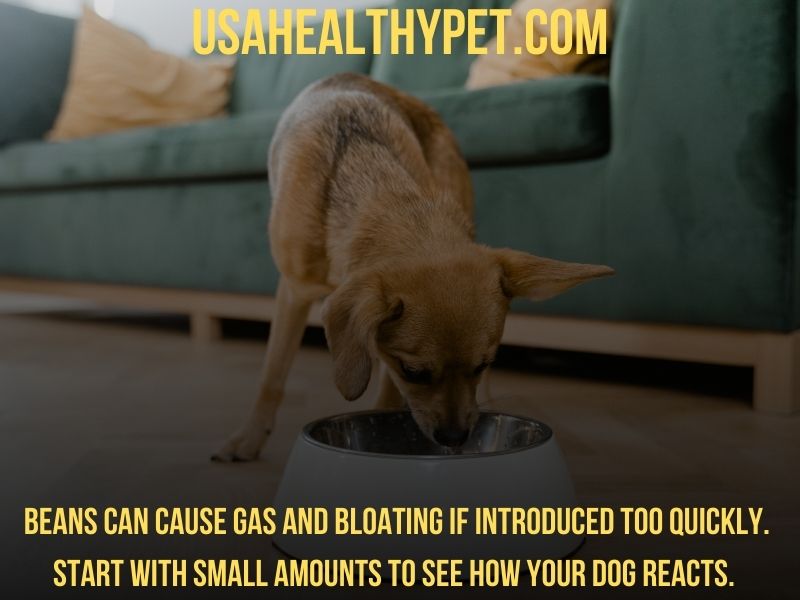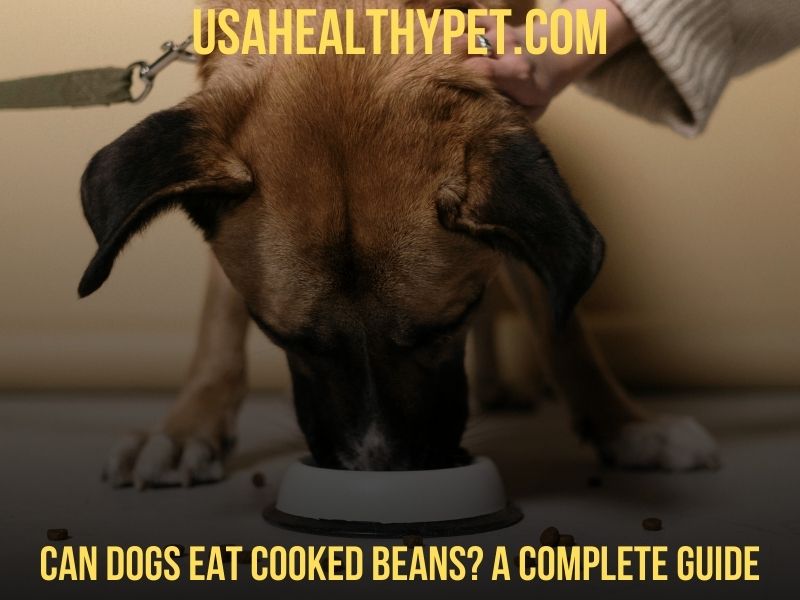Introduction
Can dogs eat cooked beans? If you’re a dog owner, you’ve probably wondered if those tasty legumes you enjoy can be shared with your furry friend.
The short answer is yes, but there’s more to consider before you start serving up a bowl of beans to Fido. Let’s dive into the details!
Are Cooked Beans Safe for Dogs?
Absolutely! Cooked beans can be a healthy addition to your dog’s diet. Cooked beans contain protein, fiber, and minerals that benefit your dog’s health.
However, not all beans are created equal, and some can be harmful to your pup. It’s essential to know which beans are safe and how to prepare them properly.
The American Kennel Club states that beans can be a healthy treat for dogs in moderation. They highlight the nutritional benefits, such as fiber and protein, but caution against beans containing harmful additives like sugar and salt.
The AKC recommends consulting with a veterinarian before introducing new foods to ensure they fit within a balanced diet.
Nutritional Benefits of Cooked Beans for Dogs
Beans are packed with protein, fiber, vitamins, and minerals that can benefit your dog’s health. They can be a great plant-based protein source, especially if your dog is on a special diet or has specific dietary needs.

Types of Beans Dogs Can Eat
Black Beans
These are a good source of protein and fiber, helping with digestion and muscle health. They also contain vitamins like A, C, and K, which support overall health.
Green Beans
Green beans are low in calories and fiber and great for weight management. They also provide essential vitamins and minerals like iron and calcium, which support bone health and blood production.
Kidney Beans
Rich in antioxidants, kidney beans can boost your dog’s immune system. They also contain essential nutrients like magnesium and potassium, which are important for heart health and muscle function.
Chickpeas (Garbanzo Beans)
These beans are full of protein and can support muscle growth and repair. They also provide fiber, which aids in digestion, and folate, which is important for cell function and development.
Lentils
Lentils are high in fiber and can help regulate your dog’s blood sugar levels. They also contain iron, which supports healthy blood cells, and polyphenols, which have antioxidant properties.
Types of Beans Dogs Should Avoid
Baked Beans
These often contain sugar, salt, and other additives that are not good for dogs. The high sugar content can lead to weight gain and dental issues, while the added salt can cause sodium ion poisoning.
Chili Beans
Spices and seasonings in chili beans can upset your dog’s stomach and be harmful. Ingredients like onions and garlic, commonly found in chili recipes, are toxic to dogs.
Fava Beans
These can cause a condition called hemolytic anemia in dogs. This condition leads to the destruction of red blood cells, which can be life-threatening if not treated promptly.

How to Safely Prepare Beans for Dogs
Cooking Methods
Always cook beans thoroughly before serving them to your dog. Raw beans can be difficult to digest and may contain toxins. Soak the beans overnight and then cook them until they are soft.
This makes them easier for your dog to digest and reduces the risk of gastrointestinal issues.
Seasoning and Additives
Avoid adding salt, spices, or other seasonings to your dog’s beans. Plain, cooked beans are the safest option.
Seasonings like garlic and onion powder can be toxic to dogs and added salt can lead to dehydration and other health issues.
Portion Control: How Much is Too Much?
Beans should be an occasional treat, not a staple in your dog’s diet. A small portion, such as a tablespoon for small dogs or a quarter cup for larger dogs, is enough.
Overfeeding beans can lead to digestive issues like gas and bloating.
Potential Health Benefits of Beans for Dogs
Weight Management
The high fiber content in beans can help your dog feel full longer, aiding in weight control. Fiber slows down digestion, which can help prevent overeating and reduce the risk of obesity.
Digestive Health
Fiber also promotes healthy digestion and regular bowel movements. It can help prevent constipation and support a healthy gut microbiome.
Heart Health
Beans are low in fat and can help maintain a healthy heart for your dog. They also contain potassium, which helps regulate blood pressure and supports cardiovascular health.
Possible Risks and Side Effects
Gas and Bloating
Beans can cause gas and bloating if introduced too quickly. Start with small amounts to see how your dog reacts. Gradually increase the portion size over time to allow your dog’s digestive system to adjust.
Allergic Reactions
Some dogs may be allergic to beans. Watch for signs of allergies, such as itching, swelling, or digestive issues.
If your dog shows any of these symptoms, stop feeding beans immediately and consult your veterinarian.
Toxicity Concerns
Certain beans, like raw or improperly cooked kidney beans, can be toxic. Always cook beans thoroughly to destroy any harmful toxins.
Avoid feeding your dog beans that have been cooked with potentially harmful ingredients like onions or garlic.

Expert Opinions on Feeding Beans to Dogs
Veterinarian Insights
Dr. Jennifer Coates, a well-known veterinarian and advisor to PetMD, suggests that beans can be a nutritious addition to a dog’s diet when prepared correctly.
She emphasizes the importance of cooking beans thoroughly and avoiding added seasonings, which can be harmful to dogs.
Pet Nutritionist Advice
Dr. Lisa Freeman, a board-certified veterinary nutritionist at Tufts University, advises that while beans can be beneficial, they should not replace meat-based proteins in a dog’s diet.
She notes that beans can complement a dog’s diet by providing additional fiber and nutrients but should be given in controlled portions to avoid digestive upset.
Beans as a Part of a Balanced Diet
Incorporating beans into your dog’s diet can provide nutritional variety and benefits.
However, they should complement, not replace, your dog’s regular food. Beans can be mixed with your dog’s regular food or given as an occasional treat.
Signs Your Dog Enjoys Eating Beans
Look for signs like wagging tails, eager eating, and overall satisfaction. If your dog seems happy and healthy, beans can be a delightful treat.
Monitor your dog for any changes in behavior or digestion after introducing beans to their diet.
Alternatives to Beans for Dogs
Vegetables
Carrots, peas, and sweet potatoes are excellent alternatives that offer similar health benefits. These vegetables are rich in vitamins and minerals and can be a tasty and nutritious treat for your dog.
Fruits
Apples, blueberries, and bananas can also be nutritious and tasty treats for your dog. Just be sure to remove any seeds or pits, as these can be harmful to dogs.
Also Read: Can Dogs or Puppies Eat Strawberry Jam?
Conclusion
So, can dogs eat cooked beans? Yes, they can! With the right preparation and in moderation, beans can be a nutritious and enjoyable addition to your dog’s diet.
Just remember to stick to safe types and avoid any harmful additives. Always consult with your veterinarian before introducing new foods to your dog’s diet.
Disclaimer:
Every dog or puppy is unique, and their dietary needs and reactions to certain foods can vary. This article is for informational purposes only and is not a substitute for professional veterinary advice. Always consult your veterinarian before introducing new foods to your dog’s diet, especially if your pet has any preexisting health conditions or dietary restrictions.
Frequently Asked Questions (FAQs)
1. Can puppies eat cooked beans?
Yes, but in very small amounts and as part of a balanced diet. Always consult your vet before introducing new foods to a puppy’s diet.
2. Can dogs eat canned beans?
It’s best to avoid canned beans due to added salt and preservatives. If you must use them, rinse thoroughly to remove excess salt.
3. Are there any beans that are toxic to dogs?
Yes, raw kidney beans and fava beans can be toxic. Always cook beans thoroughly and avoid these types.
4. Can beans help with my dog’s weight loss?
Beans can aid in weight management due to their high fiber content, helping your dog feel full longer.
5. What should I do if my dog has an adverse reaction to beans?
Stop feeding beans immediately and consult your veterinarian if you notice any signs of allergies or digestive issues.

Pingback: Can Dogs Eat Egg Rolls? Here's What You Need to Know
Pingback: Can Dogs Eat Cheez-Its? A Guide to the Risks & Alternatives